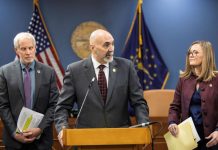Commission Recommends Local Vote On Alcohol Permits
By James Polston
TheStatehouseFile.com
INDIANAPOLIS — A commission reviewing the state’s alcohol laws recommended Friday that legislatures give communities a voice on how many alcohol permits would be allowed in some areas.
The Alcohol Code Revision Commission voted on the final recommendations for lawmakers to consider in the 2019 legislative session after a two-year process of reviewing the state’s current alcohol laws. The commission’s mandate expires Nov. 1.
Commission members recommended allowing local communities to put a question on the ballot about whether the number of alcohol permits should be increased in a designated entertainment district.
State Rep. Ben Smaltz, R-Auburn, discusses revisions to Indiana alcohol laws with members of the Alcohol Code Revision Commission at the last meeting. Photo by Eddie Drews, TheStatehouseFile.com
State Rep. Ben Smaltz, R-Auburn, said the commission gives lawmakers in the 2019 legislative session a sense of issues and a direction to follow.
“We really need to have a path, a direction, on which way to go with these issues,†Smaltz said.
The commission also voted to recommend a change to the current escrow system where individuals and businesses are allowed to acquire an alcohol permit and then place it in escrow, or reserve, Â until it has been activated.
Permits to sell alcohol are allocated according to population. If too many are held in escrow, that limits the number of places permitted to sell alcohol in a community.
The commission suggested that legislators revise the current escrow law to 36 months—if a company or individual does not put the permit to use after 24 months, the fee for the third year could increase by up to 50 percent.
Smaltz noted permits can be held in escrow for up to seven years without an increase in fee or penalty, although the current code states that it is suppose to be up to five years.
“My concern is that the current escrow system is fraught with flexibility,†Smaltz said. “That is, in my opinion, being taken advantage of.â€
Lawmakers have acted on recommendations from the commission in past legislative sessions. Last year, members recommended the state approve Sunday alcohol sales, which ended up becoming law in the 2018 session.
But there was one issue the final report did not mention—cold beer sales. The issue became controversial in 2016 when a convenience store owner found a loophole in the law that allowed him to sell cold beer under a restaurant permit.
Only licensed package liquor stores are permitted to sell cold beer, which makes Indiana the only state in the nation to ban such sales in convenience stores.
The commission also recommended various changes to permit laws, population brackets, funding and violations.
James Polston is a reporter for TheStatehouseFile.com, a news website powered by Franklin College journalism students.






